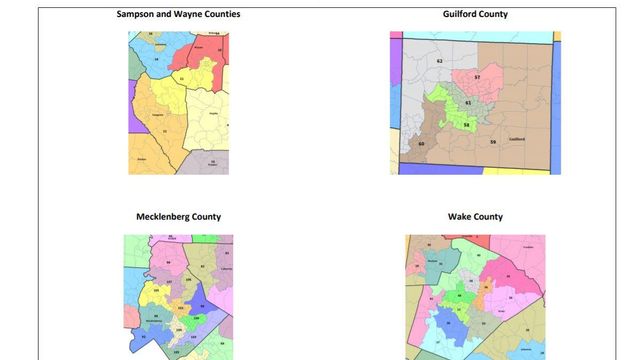Supreme Court says some, but not all, new legislative districts can be used in 2018 elections
The high court's decision came in the form of a partial stay, granted to Republican General Assembly leaders who had asked the court to block a three-judge panel's order.
Posted — UpdatedThe court did not elaborate on its decision, but during the latest round of this long-running fight over General Assembly district lines, the districts in these counties had been challenged on state constitutional grounds. Others, which the Supreme Court left in place for the coming elections, were labeled racial gerrymanders by a lower court.
The Supreme Court granted that stay in Wake and Mecklenburg counties, where five districts had been challenged as unconstitutional. Plaintiffs in the case argued that Republicans didn't have to redraw these particular districts to fix racial gerrymanders identified by the court in other districts, but that Republicans did so anyway, violating the North Carolina constitution's prohibition against mid-decade redistricting.
Redistricting is done once every 10 years, following the U.S. census, and can be done more often only under the power of a court order. The high court said it would stay the lower court's order to use the professor's districts in Wake and Mecklenburg counties until the issues with those counties' districts could be heard in more detail.
In four other districts, located in Hoke, Cumberland, Guilford, Sampson and Wayne counties, the Supreme Court denied the stay, meaning the special master's versions will be used in the May primary and November election. Outside of those districts, district lines drawn by the legislature will be used.
State Rep. David Lewis, R-Harnett, who chairs redistricting efforts for the House, said in a statement Tuesday evening that he was thankful the Supreme Court blocked an "egregious attempt to rule on purely state-law claims."
Allison Riggs, who represents voters on the other side of this case, claimed partial victory as well, saying the Republican-controlled legislature has done "all that it can to obstruct, delay and undermine" the court's order in this case.
"But now we’ll finally have districts that do not segregate voters on the basis of race," Riggs said in a statement.
Riggs' organization, the Southern Coalition for Social Justice, said it also also represents plaintiffs in a state redistricting challenge currently before the Wake County Superior Court.
“We are confident that the legislature’s gross abuse of its power will ultimately either be shot down on full appeal or addressed by the state court," Riggs said.
All 120 state House seats and all 50 state Senate seats are up for re-election this year. Filing in these races begins next Monday.
The Supreme Court's order Tuesday indicated that Justices Clarence Thomas and Samuel Alito would have granted the stay in full, siding with state Republicans. Justices Ruth Bader Ginsburg and Sonia Sotomayor would have denied the stay in its entirety, siding with Democrats trying to replace the legislature's districts with the court's.
Related Topics
• Credits
Copyright 2024 by Capitol Broadcasting Company. All rights reserved. This material may not be published, broadcast, rewritten or redistributed.






